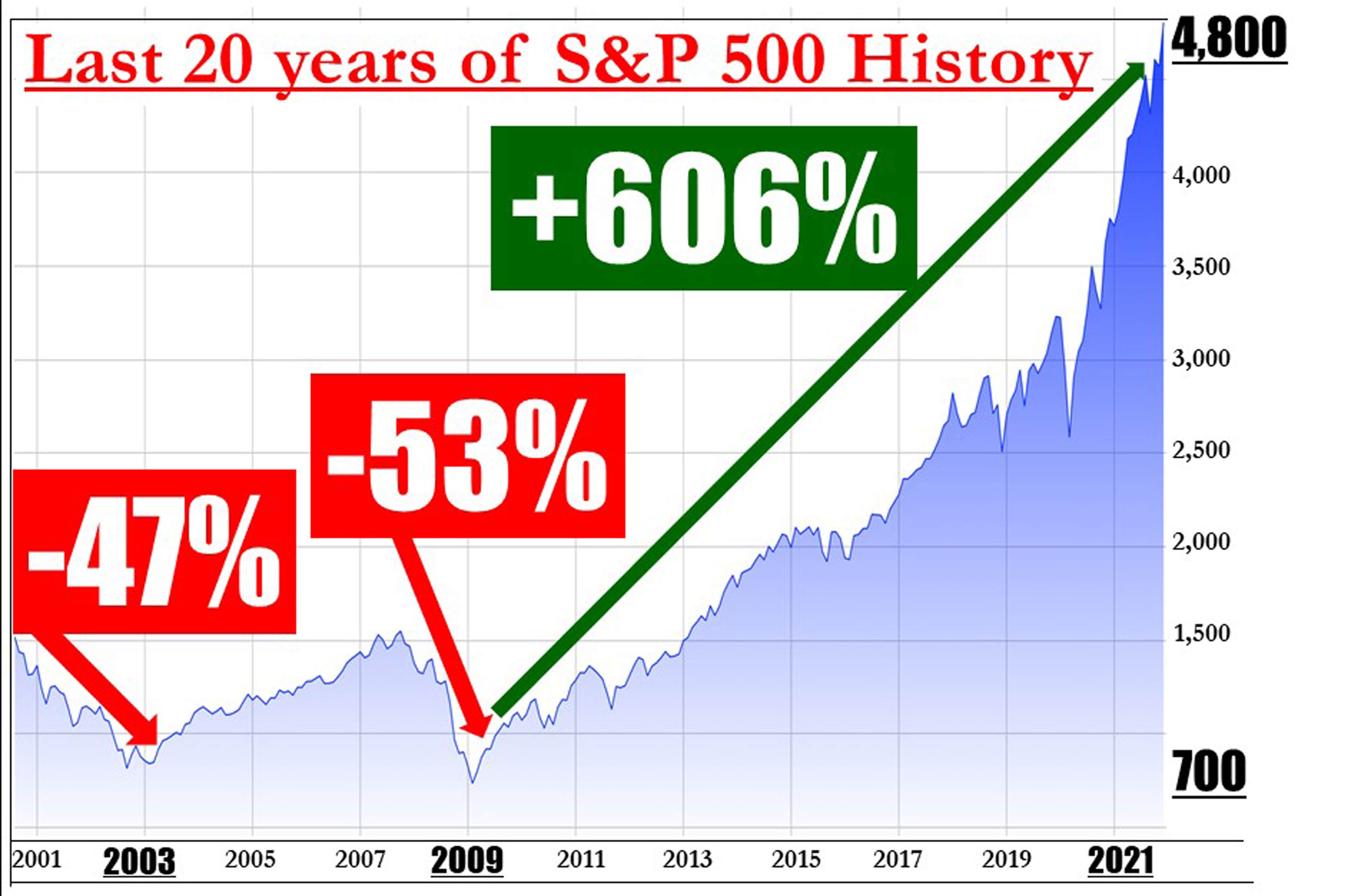Financial Advice for Millionaires: 5 Strategies for 2022
How millionaires can potentially save a lot in taxes and how to help protect the assets you leave your family and help keep them in your family bloodline long after you’re gone.


Profit and prosper with the best of Kiplinger's advice on investing, taxes, retirement, personal finance and much more. Delivered daily. Enter your email in the box and click Sign Me Up.
You are now subscribed
Your newsletter sign-up was successful
Want to add more newsletters?
For decades my firm has helped retirees preserve and help protect their wealth and leave a legacy. In these tumultuous times, here are some potential retirement and estate planning strategies for you to learn more about:
Concerned about potentially higher taxes in the future?
Our government currently has over $29 trillion in debt, so you may be concerned about potentially higher income taxes in the future.
If you have a substantial IRA (individual retirement account), that could be a “ticking tax time bomb.” Someone is going to pay taxes on that money in the future, whether it’s you or your children after you’re gone. With provisions from the Secure Act, most children can no longer do a stretch IRA as funds must be withdrawn by the end of the 10-year period after the death of the IRA owner.
From just $107.88 $24.99 for Kiplinger Personal Finance
Become a smarter, better informed investor. Subscribe from just $107.88 $24.99, plus get up to 4 Special Issues

Sign up for Kiplinger’s Free Newsletters
Profit and prosper with the best of expert advice on investing, taxes, retirement, personal finance and more - straight to your e-mail.
Profit and prosper with the best of expert advice - straight to your e-mail.
One potential strategy to help deal with this tax problem is to consider a partial Roth IRA conversion. As you probably know, while the money you put into a Roth IRA is taxed upfront, all of your gains and qualified withdrawals in retirement are free from taxes down the road. If you were a farmer, would you rather pay tax on the small seed or on the 8-foot-tall fully grown wheat? Clearly, you’d rather pay taxes on pennies not dollars, so that’s why partial Roth IRA conversions might make sense for you. You might be able to pay taxes now versus paying taxes if your Roth IRA grows in the future.
Of course, everyone’s situation is different and Roth conversions create a taxable event, therefore you should always work in conjunction with your accountant.
For more information, please read this article which I wrote for Kiplinger: The Elimination of the Stretch IRA: 7 Strategies to Consider.
How a donor advised fund works to potentially save taxes
Many people’s goal is to pay as little in taxes as possible, and each year everyone has to decide whether it’s better to take the standard deduction or the itemized deduction. The standard deduction in 2021 for married couples filing jointly is $25,100, or $27,800 if both spouses are over age 65.
If someone’s actual deductions, such as mortgage interest on a primary residence, real estate taxes up to $10,000, medical expenses (if more than 7.5% of your adjusted gross income) and charitable donations combine to be higher than the standard deduction it might make sense for them to itemize.
However, for many retirees the standard deduction is higher than itemized deductions.
So what if someone is charitably inclined? Let’s assume that normally a person donates $10,000 to charity each year. If taking the standard deduction, they wouldn’t get a tax benefit from making those charitable contributions.
However, people might look at using a donor-advised fund to potentially reduce income taxes by donating several years of future charitable contributions in one year. Donor-advised funds can be set up at many brokerage houses and invested however someone wants.
For example, let’s say someone chooses to donate five years of deductions, or $50,000, now into a donor-advised fund. The great news is that it’s possible to get a tax deduction for that full $50,000 by itemizing your deductions this year.
And what’s more, it’s possible to donate $50,000 of appreciated stock into a donor-advised fund and then sell that stock inside of the donor-advised fund and pay no capital gains on that stock sale!
Then for the next four years that person can take the standard deduction and donate the $10,000 each year to the charity directly from the donor-advised fund, and then they can start the process over every sixth year.
This could be a strategy to look into with your accountant.
Dynasty revocable trusts can help keep assets in the family bloodline
The estate planning attorneys we work with set up revocable living trusts with dynasty provisions. This means that after a husband and wife are gone, a bulletproof trust can be set up for a child that’s designed to help be divorce-protected, creditor-protected and lawsuit-protected. These trusts are intended to help protect the assets left to children and grandchildren.
Another potential benefit of these trusts is that they are designed to help keep assets in the family bloodline. After a child passes away, the funds in the trust left to that child don’t go to that child’s spouse. Instead, those trust assets only go down to their children in the same bulletproof trusts. This helps give grandchildren divorce, creditor and lawsuit protection as well.
Additionally, these trusts typically don’t give grandchildren control of the money at age 18 or 21 but wait until they are at least age 30, so they don’t make dumb mistakes early in life.
You can watch a video of one of the estate planning attorneys we work with and myself discussing advanced dynasty estate planning on YouTube.
Concerned about the next recession?
Do you think the next 10 years in the economy will look like the last 10 years? We don’t.
We've seen this movie before — sky-high real estate prices coupled with sky-high stock market prices — and we have our own ideas on how it is going to end, we just don't know when. Some retirees may be concerned about going through another 2008-type of crash again and might be looking for strategies designed to preserve and help protect their wealth.
The following is the history of the S&P 500 for the past 20 years, and while the past doesn’t predict the future, history does rhyme:

Source: www.barchart.com/stocks/quotes/$SPX/interactive-chart
Please note, it is not possible to invest directly into the S&P 500® Index; this measure is provided solely as a gauge of overall market performance. Standard & Poor’s: “Standard & Poor’s®,” “S&P®,” and “S&P 500®” are registered trademarks of Standard & Poor’s Financial Services LLC (“S&P”). The historical performance of the S&P 500 is not intended as an indication of its future performance and is not guaranteed. This chart is not intended to provide investment, tax or legal advice. Be sure to consult a qualified professional about your individual situation. This chart does not take into account investment fees, so actual results may be different than depicted above. The down percentages shown above are from the top of the market to the bottom of the market in each down move without dividends. The up percentage is from March 9, 2009, through Dec. 31, 2021, without dividends.
If you want to learn more about the current stock market and real estate market, which I’m calling the “Central Banker’s Bubble,” watch my YouTube video.
Be sure you’re not paying too much in fees in your retirement plan
Fees can be a drag on your retirement portfolio, so it’s important you’re not paying too much in fees. There are three strategies that could have fees that include financial adviser fees, mutual fund fees and variable annuities.
Your financial adviser is generally charging you a fee. That fee is negotiable, and you might be able to lower that fee from what you’re currently paying. If your adviser is not charging a fee, they generally will use investment strategies that pay them a fee, as they must get paid for their time. Make sure you know what your fees are and how your adviser is getting paid.
Mutual funds can be great because they can give you diversification, however some mutual funds have higher internal fees than others. It’s important you know what your internal fees are.
Variable annuities can have up to 6 different fees in them! So if you have a variable annuity or are thinking of buying one, please make sure you know all the facts. To learn the facts about variable annuities, you can watch my YouTube video about variable annuities.
To learn more
If you live near Boca Raton or Fort Lauderdale, Fla., learn more by attending an upcoming complimentary dinner workshop at Ruth’s Chris or Abe & Louie’s Steakhouse. This workshop is best suited for those over 65 with $500,000 to $10 million or more in investable assets. Or you can contact us to set up a Zoom meeting with Craig Kirsner, MBA, and Sean Burke, M.S., Vice President. Call our office to register now at 800-807-5558.
Stuart Estate Planning Wealth Advisors is an independent financial services firm that utilizes a variety of investment and insurance products. Investment advisory services offered only by duly registered individuals through AE Wealth Management, LLC (AEWM). AEWM and Stuart Estate Planning Wealth Advisors are not affiliated companies. Stuart Estate Planning Wealth Advisors has a strategic partnership with tax professionals and attorneys who can provide tax and/or legal advice. All investments are subject to risk, including the potential loss of principal. No investment strategy can guarantee a profit or protect against loss in periods of declining values. Any references to guarantees or lifetime income generally refer to fixed insurance products, never securities or investment products. Insurance and annuity product guarantees are backed by the financial strength and claims-paying ability of the issuing insurance company. 1166799 – 1/22
The appearances in Kiplinger were obtained through a PR program. The columnist received assistance from a public relations firm in preparing this piece for submission to Kiplinger.com. Kiplinger was not compensated in any way.
Profit and prosper with the best of Kiplinger's advice on investing, taxes, retirement, personal finance and much more. Delivered daily. Enter your email in the box and click Sign Me Up.

Craig Kirsner, MBA, is a nationally recognized author, speaker and retirement planner, whom you may have seen on Kiplinger, Fidelity.com, Nasdaq.com, AT&T, Yahoo Finance, MSN Money, CBS, ABC, NBC, FOX, and many other places. He is an Investment Adviser Representative who has passed the Series 63 and 65 securities exams and has been a licensed insurance agent for 25 years.
-
 Timeless Trips for Solo Travelers
Timeless Trips for Solo TravelersHow to find a getaway that suits your style.
-
 A Top Vanguard ETF Pick Outperforms on International Strength
A Top Vanguard ETF Pick Outperforms on International StrengthA weakening dollar and lower interest rates lifted international stocks, which was good news for one of our favorite exchange-traded funds.
-
 Is There Such a Thing As a Safe Stock? 17 Safe-Enough Ideas
Is There Such a Thing As a Safe Stock? 17 Safe-Enough IdeasNo stock is completely safe, but we can make educated guesses about which ones are likely to provide smooth sailing.
-
 Missed Your RMD? 4 Ways to Avoid Doing That Again (and Skip the IRS Penalties), From a Financial Planner
Missed Your RMD? 4 Ways to Avoid Doing That Again (and Skip the IRS Penalties), From a Financial PlannerIf you miss your RMDs, you could face a hefty fine. Here are four ways to stay on top of your payments — and on the right side of the IRS.
-
 What Really Happens in the First 30 Days After Someone Dies (and Where Families Get Stuck)
What Really Happens in the First 30 Days After Someone Dies (and Where Families Get Stuck)The administrative requirements following a death move quickly. This is how to ensure your loved ones won't be plunged into chaos during a time of distress.
-
 AI-Powered Investing in 2026: How Algorithms Will Shape Your Portfolio
AI-Powered Investing in 2026: How Algorithms Will Shape Your PortfolioAI is becoming a standard investing tool, as it helps cut through the noise, personalize portfolios and manage risk. That said, human oversight remains essential. Here's how it all works.
-
 A Newly Retired Couple With a Portfolio Full of Winners Faced a $50,000 Tax Bill: This Is the Strategy That Helped Save Them
A Newly Retired Couple With a Portfolio Full of Winners Faced a $50,000 Tax Bill: This Is the Strategy That Helped Save ThemLarge unrealized capital gains can create a serious tax headache for retirees with a successful portfolio. A tax-aware long-short strategy can help.
-
 5 Retirement Myths to Leave Behind (and How to Start Planning for the Reality)
5 Retirement Myths to Leave Behind (and How to Start Planning for the Reality)Separating facts from fiction is an important first step toward building a retirement plan that's grounded in reality and not based on incorrect assumptions.
-
 I'm a Financial Adviser: Silence Is Golden, But It Hurts Your Heirs More Than You Think
I'm a Financial Adviser: Silence Is Golden, But It Hurts Your Heirs More Than You ThinkTalking to heirs about transferring wealth can be overwhelming, but avoiding it now can lead to conflict later. Here's how to start sharing your plans.
-
 Will Your Children's Inheritance Set Them Free or Tie Them Up?
Will Your Children's Inheritance Set Them Free or Tie Them Up?An inheritance can mean extraordinary freedom for your loved ones, but could also cause more harm than good. How can you ensure your family gets it right?
-
 I'm a Financial Adviser: This Is the Real Key to Enjoying Retirement With Confidence
I'm a Financial Adviser: This Is the Real Key to Enjoying Retirement With ConfidenceA resilient retirement plan is a flexible framework that addresses income, health care, taxes and investments. And that means you should review it regularly.